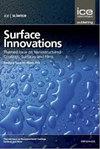Mask-assisted chemical processing methods to fabricate wettability patterns on copper substrates for liquid manipulation
IF 3.5
4区 材料科学
Q3 CHEMISTRY, PHYSICAL
引用次数: 0
Abstract
Extreme wettability-patterned surfaces have attracted great attentions due to their excellent application prospects for liquid manipulation. However, developing a simple and universal method to fabricate wettability patterns on a variety of metals remains a great challenge. In this work, we developed three specific preparation approaches to fabricate wettability patterns on copper substrate using chemical processing combined with mask technology. Surface wettability can be suitably controlled by changing the solution concentration and immersing time. The surface has good stability and low pollution under external action. Three preparation methods have differences in preparation process, wettability and mask function. On the basis of these approaches, various complex wettability patterns could be prepared on different metal substrates using designed masks. Furthermore, various wettability-patterned surfaces were successfully fabricated for liquid manipulating applications, such as controlling fluid shape and water transport. These methods proposed is expected to have promising application potential in patternable printing, water collection and heat-dissipation devices.掩模辅助化学处理方法在铜衬底上制造用于液体操作的润湿性图案
极端润湿性图案化表面由于其在液体操纵中的良好应用前景而引起了人们的极大关注。然而,开发一种简单通用的方法来在各种金属上制造润湿性图案仍然是一个巨大的挑战。在这项工作中,我们开发了三种特定的制备方法,利用化学处理和掩模技术在铜衬底上制备润湿性图案。可以通过改变溶液浓度和浸渍时间来适当地控制表面润湿性。该表面在外部作用下具有良好的稳定性和低污染。三种制备方法在制备工艺、润湿性和掩模功能方面存在差异。基于这些方法,可以使用设计的掩模在不同的金属基底上制备各种复杂的润湿性图案。此外,成功地制备了各种润湿性图案化表面,用于液体操纵应用,例如控制流体形状和水传输。这些方法有望在可图案化印刷、集水和散热器件中具有很好的应用潜力。
本文章由计算机程序翻译,如有差异,请以英文原文为准。
求助全文
约1分钟内获得全文
求助全文
来源期刊

Surface Innovations
CHEMISTRY, PHYSICALMATERIALS SCIENCE, COAT-MATERIALS SCIENCE, COATINGS & FILMS
CiteScore
5.80
自引率
22.90%
发文量
66
期刊介绍:
The material innovations on surfaces, combined with understanding and manipulation of physics and chemistry of functional surfaces and coatings, have exploded in the past decade at an incredibly rapid pace.
Superhydrophobicity, superhydrophlicity, self-cleaning, self-healing, anti-fouling, anti-bacterial, etc., have become important fundamental topics of surface science research community driven by curiosity of physics, chemistry, and biology of interaction phenomenon at surfaces and their enormous potential in practical applications. Materials having controlled-functionality surfaces and coatings are important to the manufacturing of new products for environmental control, liquid manipulation, nanotechnological advances, biomedical engineering, pharmacy, biotechnology, and many others, and are part of the most promising technological innovations of the twenty-first century.
 求助内容:
求助内容: 应助结果提醒方式:
应助结果提醒方式:


